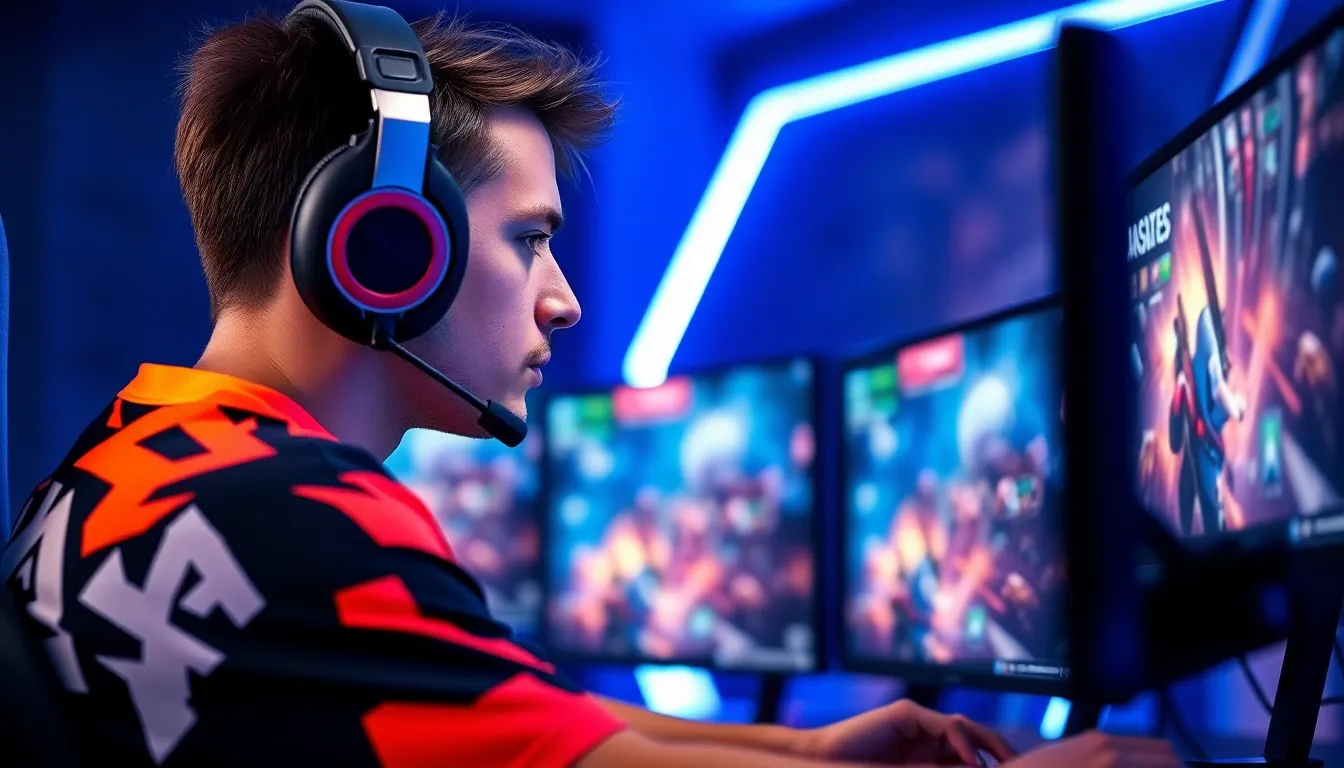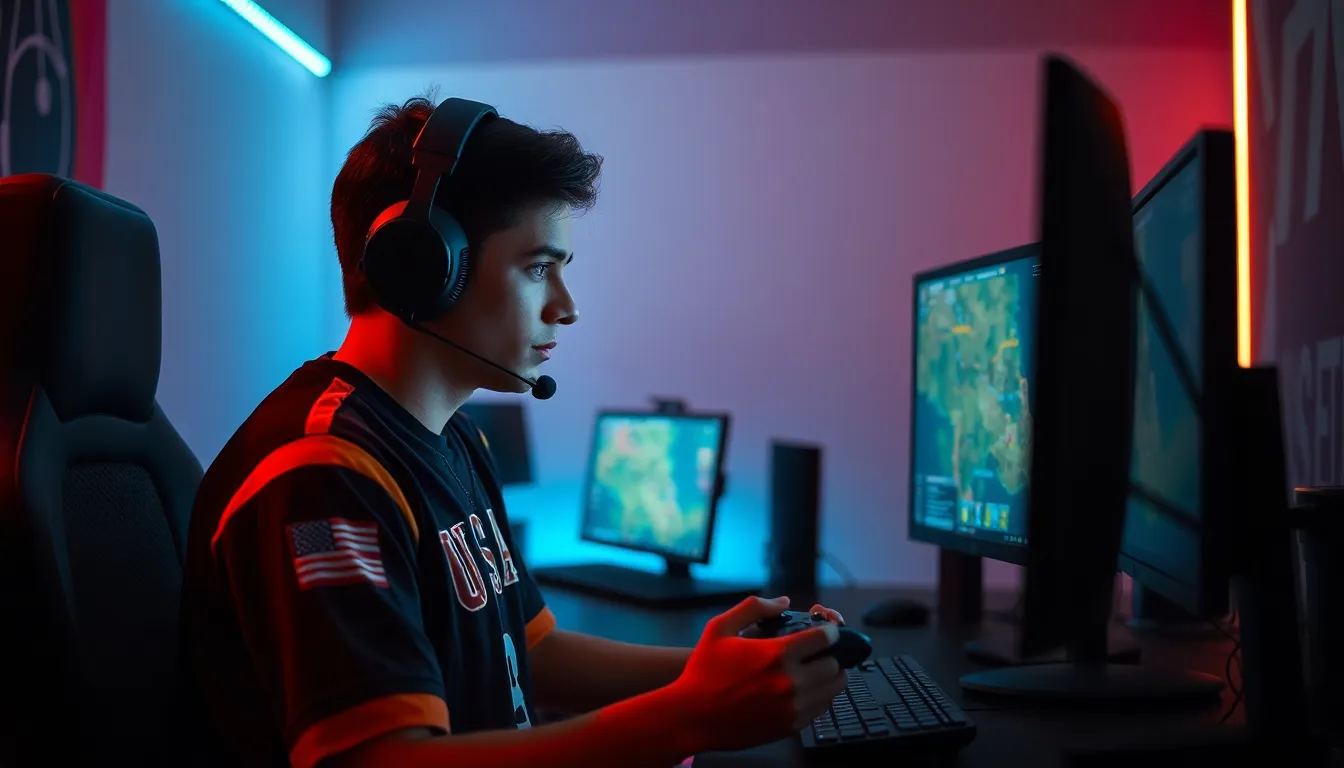The Best Fluffy Pancakes recipe you will fall in love with. Full of tips and tricks to help you make the best pancakes.

Competitive Gaming Strategies: Master the Art of Outplaying Your Opponents
In the fast-paced world of competitive gaming, strategy isn’t just a buzzword; it’s the secret sauce that separates the champions from the couch potatoes. Imagine diving into a virtual battlefield armed not just with a controller but with a master plan that would make even Sun Tzu nod in approval. Whether it’s outsmarting opponents or executing flawless team plays, the right strategies can turn the tide of battle in an instant.
Competitive Gaming Strategies
Competitive gaming involves players or teams competing in various video games, often in organized formats like tournaments. It focuses on skill, tactical thinking, and teamwork.
Definition of Competitive Gaming
Competitive gaming refers to organized gameplay where individuals or teams participate in contests aiming for victories. Popular genres include first-person shooters, real-time strategy games, and multiplayer online battle arenas. Players engage in ranked matches, tournaments, and leagues. Tournaments frequently have cash prizes, sponsor support, and significant media attention. Understanding these facets is essential for players aspiring to excel.
Importance of Strategy in Gaming
Strategy plays a vital role in determining outcomes in competitive gaming. A well-defined strategy enables players to anticipate opponents’ moves. Top players often analyze previous matches to refine their tactics. Effective communication within teams enhances coordination and decision-making. Many battles depend on strategic positioning and timing. The consequence of not employing sound strategies leads to frequent losses. In highly competitive environments, even minor tactical advantages can turn the tide.
Key Components of Effective Strategies

Effective strategies hinge on several crucial elements that enhance competitive gaming success. Focusing on game knowledge and communication creates a solid foundation for performance.
Game Knowledge and Preparation
Deep understanding of the game environment holds great importance. Players benefit from mastering mechanics, maps, and character abilities. Studying opponents’ playstyles helps anticipate their moves effectively. Preparing by analyzing previous match footage leads to informed adjustments in strategy. Familiarizing oneself with updates and meta shifts also plays a key role in staying competitive. Developing a personal playstyle enhances adaptability within varying game scenarios. Balancing practice with reflection ultimately sharpens skills for high-stakes gameplay.
Communication and Teamwork
Strategic success frequently depends on effective communication among team members. Establishing clear roles and responsibilities fosters accountability. Utilizing voice chat or in-game communication tools ensures timely information exchange. Coordinated strategies often translate to successful execution during matches. Encouraging open discussions regarding tactics helps identify strengths and weaknesses. Building trust among teammates cultivates a supportive environment, boosting morale. Consistent practice with synchronized movements amplifies overall performance. Teamwork becomes a defining factor in achieving victory in competitive settings.
Developing Your Competitive Edge
Competitive gaming demands a sharp focus on strategy for players to excel. Key elements include thorough opponent analysis and the ability to adapt to various game types.
Analyzing Opponents
Understanding opponents’ strategies can provide a significant advantage. Players benefit from reviewing previous match footage to identify patterns in behavior. Observing how opponents react in critical situations allows for developing counter-strategies. Match analysis often reveals weaknesses, enabling players to exploit them during gameplay. Insights into an opponent’s preferred tactics lead to informed decisions and better performance. Player tendencies, such as rush strategies or defensive playstyles, require careful evaluation for effective countermeasures. Gathering this information fosters adaptability and strategic planning.
Adapting to Different Games
Flexibility in strategy ensures success across diverse game types. Familiarity with mechanics, objectives, and character abilities differs from game to game. Players must quickly learn new gameplay elements and adapt their strategies accordingly. Transitioning between genres, such as first-person shooters and real-time strategy games, requires unique tactical approaches. Each game environment offers distinctive challenges, from map layouts to team dynamics. Adapting tactics effectively involves researching game-specific strategies and practicing them. Players who embrace these changes improve their skill sets and stay competitive in dynamic gaming landscapes.
Popular Competitive Gaming Strategies
Understanding various competitive gaming strategies plays a crucial role in achieving success. Players often employ distinct approaches, with offensive and defensive strategies being among the most prominent.
Offensive Strategies
Offensive strategies focus on aggressive tactics to overwhelm opponents. Players frequently adopt high-pressure techniques that force their adversaries into mistakes. Utilizing map control becomes essential, as it provides opportunities for ambushes and flanking maneuvers. Aggressive positioning also enables players to maintain offensive pressure, increasing damage output. Experimenting with various character abilities allows players to adapt quickly and capitalize on advantageous situations. For instance, in first-person shooters, utilizing weapons with high fire rates can create a significant impact. Overall, a well-executed offensive strategy often results in swift victories.
Defensive Strategies
Defensive strategies prioritize protection and survivability in competitive settings. Players often establish strong formations to create a solid defensive line against incoming attacks. Effective communication among team members becomes vital in organizing defensive maneuvers and ensuring proper coverage of key areas. Utilizing defensive abilities, such as shields or healing, can significantly enhance team longevity during engagements. Awareness of opponents’ movements allows teams to prepare countermeasures and maintain strategic positions. For example, in multiplayer online battle arenas, controlling chokepoints can lead to advantageous outcomes. Ultimately, proper execution of defensive strategies can postpone losses and set the stage for counterattacks.
Conclusion
Mastering competitive gaming strategies is crucial for anyone looking to excel in the gaming arena. Players who invest time in understanding game mechanics and analyzing opponents can significantly enhance their performance. Effective communication within teams fosters a cohesive unit capable of executing strategies seamlessly.
As the gaming landscape continues to evolve, adaptability becomes essential. Players must remain open to refining their tactics and learning from each match. By prioritizing strategic thinking and collaboration, gamers can not only improve their skills but also increase their chances of achieving victory in high-stakes competitions.
